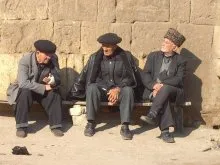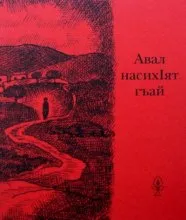
Several years ago the translator who was first to join the present team (let us call him Ibrahim) shared his attitude to IBT’s work as follows: “What is most interesting for me in this work is the translation process itself. Second is the opportunity to see how the world’s languages have a similar, miraculous capacity to express even the most difficult meanings found in the Bible, although they do this in very different ways. It’s a pity that I don’t know English, but praise God, I do know Russian well, and still greater praise to God that I know Dargi well enough to pass on to my people the powerful texts of this Scripture. And the third reason is my own self-interest, since I am a scholar specializing in lexicology, and am working on the Dargi-Russian dictionary. Bible translation helps a lot in this work. Thanks to my Bible translation experience I have found dozens of old Dargi words and archaic expressions; this work helped our team to start using Dargi vocabulary more extensively. And we even coined several new terms. Why not? After all, translation work is an art form of sorts. In the IBT translation process, I especially love field-testing. I personally did my post-graduate work in Dargi studies, but there are many people who don’t know the Dargi literary language very well and who don’t know the Bible either. Moreover, they don’t know any Scriptures at all, whether Muslim or Christian ones! And when these readers discover the very existence of such translations, it’s like a revelation for them. They get excited. They get acquainted with these texts for the first time in their lives and wonder how such a thing could even exist.”

Interestingly, at the recent IBT-hosted seminar on the Pentateuch, where this conversation took place, Ibrahim felt just as elated as his colleague, but for him the reason was purely professional. His deepening involvement in Bible translation work made him thirst for learning the languages of the original: “During the past two years together with our new exegete we’ve done a large amount of work on revising the books of the New Testament. We checked each sound in the text, each and every letter, and we found terms that are even more precise, more fitting and clear to the reader than the terms in the first version of the translation. For example, in the previous version the Dargi text said that John the Baptist was “purifying” people with water, but now he is “immersing them in water”. During field-testing, people found the new version of the text easier both for reading and understanding. Their approval is a high evaluation of what we’ve done. Due to our intense work I came to the conclusion that translators are in dire need of mastering the original languages of the Bible. I found that Greek syntax is much closer to the Dargi syntax than Russian is. Of course we do have exegetes with a good command of Greek, and we have a special computer program (Paratext) for Bible translators, but if I could read the words of the original directly, without intermediaries, it would be easier for me to translate. We need a methodology for studying the basics of elementary Greek, and then we will be ready to proceed independently – we will fly towards our goal fast, like birds!”


So what motivates one to become a Bible translator? In each project the answer may differ. But for all three Dargi team members, their work is an attempt to follow “the way of truth” (Ps 119:30) in their lives, whether by striving to know the essence of the original languages, or through seeking and recognizing “the real thing”, or by pursuing honesty in one’s translation.
We would greatly appreciate your financial assistance towards this project.
If you prefer to send your donation through a forwarding agent in the U.S. or Europe,
please write to us and we'll provide the details of how this can be done.
IBT Russia/CIS is a non-profit organization financed through contributions from individuals, sponsoring organizations and foundations.
You can donate to IBT:
Through: AO UniCredit Bank, Moscow
SWIFT: IMBKRUMM
In favour of: Institute for Bible Translation
Address: 119334, Russia, Moscow, Andreevskaya nab. 2
TIN (INN) 7736231521
9-digit Bank identification code in Russian banking system: 044525545
Account no. (IBAN):
634261 USD 4020 02 001 or 40703840700010142881
634261 EUR 4020 02 001 or 40703978700010366720
634261 GBP 4020 02 001 or 40703826600010366723
Through: NOSTRO ACCOUNTS OF AO UNICREDIT BANK, MOSCOW:
USD JPMORGAN CHASE BANK N.A., NEW YORK SWIFT CODE: CHASUS33
EUR UNICREDIT BANK AG (HYPOVEREINSBANK) , MUNICH SWIFT CODE: HYVEDEMM
EUR UNICREDIT BANK AUSTRIA AG, VIENNA SWIFT CODE: BKAUATWW
EUR UNICREDIT S.P.A., MILANO SWIFT CODE: UNCRITMM
GBP THE ROYAL BANK OF SCOTLAND PLC, LONDON SWIFT CODE: RBOSGB2L
Important! In the field "designation" write "CHARITY DONATION"
For more information address IBT
You may sign up to receive our Russia/CIS monthly English newsletter here
